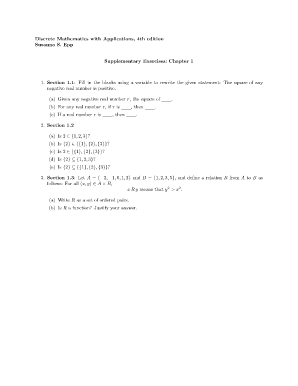고정 헤더 영역
상세 컨텐츠
본문
Susanna Epp's DISCRETE MATHEMATICS WITH APPLICATIONS, FOURTH EDITION provides a clear introduction to discrete mathematics. Renowned for her lucid, accessible prose, Epp explains complex, abstract concepts with clarity and precision. This book presents not only the major themes of discrete mathematics, but also the reasoning that underlies mathematical thought. Students develop the ability to think abstractly as they study the ideas of logic and proof.
While learning about such concepts as logic circuits and computer addition, algorithm analysis, recursive thinking, computability, automata, cryptography, and combinatorics, students discover that the ideas of discrete mathematics underlie and are essential to the science and technology of the computer age. Overall, Epp's emphasis on reasoning provides students with a strong foundation for computer science and upper-level mathematics courses.Important Notice: Media content referenced within the product description or the product text may not be available in the ebook version. Epp received her Ph.D. In 1968 from the University of Chicago, taught briefly at Boston University and the University of Illinois at Chicago, and is currently Vincent DePaul Professor Emerita of Mathematical Sciences at DePaul University. After initial research in commutative algebra, she became interested in cognitive issues associated with teaching analytical thinking and proof and published a number of articles related to this topic, one of which was chosen for inclusion in The Best Writing on Mathematics 2012.
Discrete Math Pdf Book
She has spoken widely on discrete mathematics and organized sessions at national meetings on discrete mathematics instruction. In addition to Discrete Mathematics with Applications and Discrete Mathematics: An Introduction to Mathematical Reasoning, she is co-author of Precalculus and Discrete Mathematics, which was developed as part of the University of Chicago School Mathematics Project. The third edition of Discrete Mathematics with Applications received a Texty Award for Textbook Excellence in June 2005. Epp co-organized an international symposium on teaching logical reasoning, sponsored by the Institute for Discrete Mathematics and Theoretical Computer Science (DIMACS), and she was an associate editor of Mathematics Magazine from 1991 to 2001.
Discrete Mathematics Pdf Book
Long active in the Mathematical Association of America (MAA), she is a co-author of the curricular guidelines for undergraduate mathematics programs: CUPM Curriculum Guide 2004. She received the Hay Award for Contributions to Mathematics Education in 2005 and the Award for Distinguished Teaching given by the Illinois Section of the MAA in 2010.
Susanna Epp's DISCRETE MATHEMATICS, THIRD EDITION provides a clear introduction to discrete mathematics. Renowned for her lucid, accessible prose, Epp explains complex, abstract concepts with clarity and precision. This book presents not only the major themes of discrete mathematics, but also the reasoning that underlies mathematical thought. Students develop the ability t Susanna Epp's DISCRETE MATHEMATICS, THIRD EDITION provides a clear introduction to discrete mathematics. Renowned for her lucid, accessible prose, Epp explains complex, abstract concepts with clarity and precision. This book presents not only the major themes of discrete mathematics, but also the reasoning that underlies mathematical thought. Students develop the ability to think abstractly as they study the ideas of logic and proof.

While learning about such concepts as logic circuits and computer addition, algorithm analysis, recursive thinking, computability, automata, cryptography, and combinatorics, students discover that the ideas of discrete mathematics underlie and are essential to the science and technology of the computer age. Overall, Epp's emphasis on reasoning provides students with a strong foundation for computer science and upper-level mathematics courses. By itself, I think this book is lacking something.
However, when read in parallel with Rosen's book (I know, two discrete math books simultaneously is a recipe for insanity) it shows it's true value. Epp explains some things very well but at the end of the day she's a math guru, and as with almost all math gurus I've encountered, she has difficulty packaging complex subjects into digestible, teachable chunks. She's better than Rosen, I'll give her that.It's unfortunate that the selection of text By itself, I think this book is lacking something. However, when read in parallel with Rosen's book (I know, two discrete math books simultaneously is a recipe for insanity) it shows it's true value.
Discrete Math Epp Pdf Editor Examples
Epp explains some things very well but at the end of the day she's a math guru, and as with almost all math gurus I've encountered, she has difficulty packaging complex subjects into digestible, teachable chunks. She's better than Rosen, I'll give her that.It's unfortunate that the selection of textbooks is so limited in this field. Every instructor that I've had for DM explains the subject better than textbook authors by a wide mile, but writing 1,000 pages on DM is probably too daunting a task for them so their wisdom is never documented. Instead, we keep turning to Rosen and Epp.Oh well, it's only a class. I don't read too many textbooks that are actual textbooks, but this was a necessary read as I could not quite understand my professor's instructions.
I actually read this one and made a wonderful grade in my graduate course because of it. I found some concepts and problems to be too simple and other too complex for what I read in the chapter. I'm very glad that the author made this readable as there are some mathematics textbooks, specifically one of calculus textbooks, that make it challenging I don't read too many textbooks that are actual textbooks, but this was a necessary read as I could not quite understand my professor's instructions. I actually read this one and made a wonderful grade in my graduate course because of it. I found some concepts and problems to be too simple and other too complex for what I read in the chapter. I'm very glad that the author made this readable as there are some mathematics textbooks, specifically one of calculus textbooks, that make it challenging on students to really understand the material.




